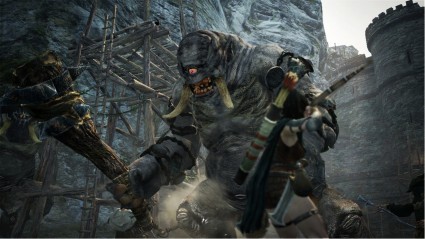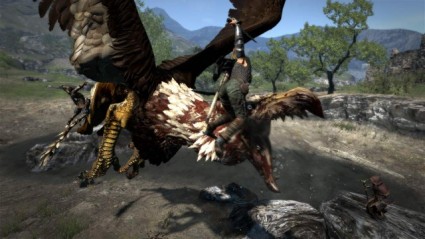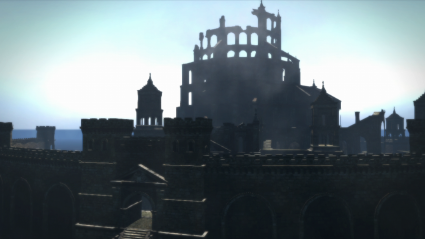Reviews
Dragon’s Dogma
June 15, 2012, Author: Trent Pyro
Skyrim. The Witcher. Dragon Age. These names all say one thing; adventure. Massive worlds with endless hours of exploration and battle. Mad kings, demons, dragons and monsters the likes of which we couldn’t imagine. Fantasy, intrigue, betrayal and death. Exciting, enthralling and irresistible.
Yet it’s odd to think that, for all their brilliance, none of these games contain much adventure at all. Quest markers and in-depth descriptions tell you where to go and what to look for. Everything is orchestrated and set in place for you to succeed and enjoy being the hero.
Capcom are set to change that with Dragon’s Dogma. A new breed of adventure that truly captures the danger, fear and threat of true exploration, it has already been misunderstood and swept aside by much of the media and public. I’m here to set the record straight and to tell you that Dragon’s Dogma is the first true adventure game since they had graphics.
A tale little told…
Ok so after that mildly sensationalist opening, I feel I have to explain myself. While most other games are so scared you’ll get bored you’re constantly bombarded with objectives and markers and people to talk to, Dragon’s Dogma doesn’t care. The story is laid extremely thin, with cut scenes and progression points hours apart. There’s no urgency to it at all and there’s no chance of you feeling rushed. That’s not to say there isn’t a story though.
You begin by playing as the default character right away. Journeying through a dank cave system, it serves as a tutorial and prologue. After slaying a Chimera, a voice tells you that you must make a choice; live your life selfishly or give your life to protecting the world. You then get to design your own character in a creation system more reminiscent of Soul Calibur or a WWE game than an RPG. Every tiny detail can be adjusted and character-creation lovers will go nuts for the options on offer.
Anyway, an unexplained number of years later and the sleeping fishing village of Cassardis, on the east coast of Gransys, is needlessly attacked by a massive dragon. Everyone screams and runs except you, for some reason. As you battle the beast with a rusty blade, you’d be forgiven for being a bit confused. After a few minutes of pointless attempt, the dragon plucks out your heart and gulps it down.
That’s not the end of you, though. You wake up and become The Arisen. Foretold to be the slayer of dragons, among other things, you’re left to pick your initial vocation (read: class) and then left to your own devices. There’s no quest marker or real direction. You actually have to get off your arse and walk about, chat to people and figure out where to go from there. The real story doesn’t even start until you reach the capital city of Gran Soren, which could be hours depending on how you play.
You see, Dragon’s Dogma combines written plot with personal experience better than any game I’ve ever seen. Where you go, what you choose to do and when will define your experience almost entirely. You could be a compulsive adventurer who arrives in Gran Soren already battle-worn after venturing out in all directions, tenaciously slaying beasties; or you could be the dedicated Arisen who follows the vague path to Gran Soren with little deviation.
The story that is presented to you is compelling enough, with set-pieces abound and intrigue around every corner. When you get into it, it’s more than interesting enough to keep you playing; but that’s not why you will. Dragon’s Dogma is a game that speaks for itself…
A new kind of adventure
Dragon’s Dogma is experienced in two phases. Where the first phase ends is different for each player and I suppose is the key to whether you’ll become as absorbed in the world of Gransys as I have, or if you’ll simply give up and play something else. I’ll get to that in a bit though.
While some experiences are driven by story or combat, Dragon’s Dogma is driven by exploration. With no fast-travel (save a pricey, one-use item) and no mounts of any kind, every trip is an adventure. You do have a map, but must explore to uncover it. You do get quest markers, but they’re often placed deep within fogged sections of the map, forcing you to venture in their general direction and find your way. Everything is geared towards making you explore and discover the land of Gransys for yourself. This tack is either the game’s greatest asset or its fatal flaw depending in your outlook.
If you view games as led adventures, experiences where you play the hero who is directed through a tale of success and legend to save the world, it’s likely you’ll find Dragon’s Dogma too empty. Endless travelling and fighting separate sparse plot advances and swamp progression in a mire of constant struggle. The lack of fast-travel will likely vex you and you’ll see the repeated need to travel the roads on foot as a needless chore.

When in doubt, go for the eye...
Yet if you see games as pure experiences (presented as they are, whatever that may be), then you’ll be on the right track to understanding what makes Dragon’s Dogma so brilliant. It allows you, almost forces you in fact, to be clever. If you’re told to find a particular item, it doesn’t tell you where it is. It allows you to think for yourself which is initially baffling. We’re so used to being pointed in the right direction we’re sideswiped when we actually have to think logically.
One mission, for example, tasks you with finding a magical book. You’re told some bandits may have stolen it and are given a quest marker to a far off bandit camp. After fighting through rock-solid enemies to reach it, you find nothing. It’s likely you’ll be stumped at what to do; no more markers and no more instructions. Bugger. So you trek back to Gran Soren to see if the quest-giver has any more info, coming across a bunch of thieves on the way.
After beating them and saving a passer-by from certain death, he tells you that those thieves are based near Witchwood and yes, he’s heard that they have a magic book. Still no quest marker, you’re told it’s in West Gransys. So you find the only entrance to that part of the land and follow the roads, fighting as you go. When you finally do come across the thieves den you get a genuine feeling of achievement. You’ve cracked it, you’ve discovered something for yourself. Against the odds, you have succeeded; and the game didn’t tell you how to do it.
You’re not alone in your quest either, due to the near-revolutionary Pawn system. Pawns are beings from another world that appear human but lack the spark that makes us special. They are sworn to follow The Arisen to whatever end and will form your 4-person party throughout the game.
The first one is yours forever; your main Pawn. You create them once you reach Gran Soren using the same system as you did to create your player character, allowing for a totally unique Pawn. You can recruit 2 more using Rift Stones and this is where the individuality of your Pawn becomes paramount. Through a new and exciting system, the Pawns you hire are actually other players’ main Pawns. I’ll explain more later but safe to say they are essential for success in combat; and boy did Capcom make it fun.
On the surface it’s a basic mix of light and heavy attacks, supplemented by a set of vocation-specific skills. Which vocation you choose (from a pool of 9) will determine your position in battle and the tactics you’ll have to use to succeed. It’s solid and adaptable; a necessity with the range of enemies on offer. Each vocation has it’s strengths and weaknesses and finding the one that fits your play style is key to enjoying the game.
Fighters and Warriors are melee focused, while Striders and Rangers can use bows to hit enemies from afar. Mages and Sorcerers make up the obligatory magic category and are essential for any party. The Assassin, Magick Archer and Mystic Knight are hybrid mixes of the other classes, allowing you to branch out a little and learn a wider range of skills, although even these vocations have a specific place in battle. Keeping a good mix of skills and abilities in your party is absolutely essential for tackling the myriad challenges Gransys has to offer.
Yet what sets Dragon’s Dogma’s combat apart from its peers is the sheer physicality. Fire will burn realistically, scorching and distracting enemies and softening up hulking foes. You can burn the wings of flying creatures to bring them down or set fire to an ogre’s head to blind it.
More than simple spells and effects, the world can be a weapon. You can grab and pick up almost anything, including small enemies. Foe too hard to beat? Stun him and throw him off a cliff. Want to get the drop on a savage group? Drop an explosive barrel on them from a ridge above. You can even grab and climb large enemies to reach their weak points or get the better of them.
Ogres can be tricked into snatching off their own helmets; heavy characters can weigh down griffons and prevent them from flying away. Clambering atop a towering beast with your main Pawn, hacking away at its head as a Mage sets it alight and a Ranger peppers its eye with arrows is a sight to behold and immensely exciting.
Now I mentioned two phases before. The first phase is horrible. Every single enemy is rock solid and any extensive deviation from the set path will cause instant, miserable death. The game initially stifles you with impossibly hard enemies at every turn and then taunts you with quests you quickly realise you won’t be able to complete for a very long time. Everything is a struggle and a chore, slogging from place to place barely surviving.
It seems almost pointless and you’ll likely reach a point where your only solution is to keep banging your head against a wall until you make some progress somewhere. Anywhere. Hiring high-level Pawns feels like a cop-out and grinding is no fun at all. The difficulty feels unnecessary and crazy; why would anyone do this to their game?! Then, however, just as you’re considering whether you made the right choice of game, it begins to crack and phase two shines through.

Grab its head and slash it as it flies away. It's just as awesome as it sounds.
You start to realise that it’s all part of the plan. Dragon’s Dogma throws you into a boiling pot of danger and brutality and forces you to think its way. So used to jogging off and laying waste to entire species, you’re brought down to human level again. You begin to get used to checking your stocks of lamp oil and curatives before you leave the safety of Gran Soren. Night is much more dangerous than day, so you sleep at the inn and set off at the crack of dawn.
You learn how to quest, how to explore. For the first time you, the player, have to learn new skills and habits and get into a new mindset to succeed. You can’t play Dragon’s Dogma like every other action-RPG before it; you’ll die all the time and never get anywhere. Tentative and timid ventures into the unknown become confident and valiant pushes into mysterious territory, your confidence built up from hours and hours of real experience instead of some backstory that makes you Superman. It’s thrilling and enthralling, but more than that, it’s genuinely exciting.
Reaching a destination after ages of tough journey across dangerous terrain, dashing to a rest camp while fleeing an unbelievably powerful foe, discovering a brand new structure or area. The feeling of wonder and discovery that is often missing from our games is present here in full force. You’re not just seeing something you’ve been told about for the first time; you’re genuinely discovering it. Its location, its looks, its size; even its very existence.
There are issues that prevent Dragon’s Dogma from being perfect, though. Combat can be grossly unfair as there’s no way to tell which enemies are out of your league. The quest system doesn’t help, regularly presenting you with quests that are impossible to complete until much later in the game. The only way to find out is to give it a go, which would be fine and likely folded in as part of the experience if the penalties for misjudging a fight weren’t so high. Hours of gameplay can be lost simply because you bit off more than you could chew due to lack of information.
While pawns are intelligent and in my experience never get themselves killed, fall off cliffs or get in your way, they do attract an enormous amount of agro, making stealth impossible. Their shouted suggestions can become repetitive after a long time too; I do not need to be told every time I fight a cyclops that they’re weak to lightning, especially since I’m a fucking Warrior. While the pawn system feels well designed overall, when it’s stretched over the countless hours it’ll take you to finish Dragon’s Dogma, the cracks glare and a bit more spit and polish in this area would’ve done the game wonders.
Most of my other niggles are just pet hates of mine; overly restrictive classes, a lack of usable abilities for the Warrior due to a programming blip, a lead character who doesn’t speak, NPCs who feel a bit wooden. None of these things are major issues and as a package Dragon’s Dogma is a fantastic experience once you get into it.
Welcome to Gransys
As with any open-world RPG, Dragon’s Dogma has its own lush world to bolt around. While it’s smaller than it first appears and generally fits into the ‘green fields’ and ‘dry rocks’ categories, it’s rendered in beautiful detail.
While I wouldn’t say the graphics are up there with the eye-watering Gears 3 or the astonishing Max Payne 3, the claims of ‘last-gen’ looks are certainly full of shit. Gransys is a gorgeous land of greenery, peppered with ruins, settlements and cliffs. While only Gran Soren has much of an identity, the nature of the game allows you almost to forgive this. Almost.
The idea is to explore and discover, and while you often discover little in the way of unique areas, the locales presented are vibrant and rich with life. The landscape does have its surprises and they feel all the more special considering the small number of them. When you least expect it the game will throw you a visual bone, often causing you to stop and just look in awe.
The human characters, as ever, aren’t quite as wonderful. They remind me of Oblivion NPCs and are the only thing that could be considered as being from a different generation. While they serve their purpose, wondering about Gran Soren and getting jumped by bandits on the dangerous roads, most are so bland and lifeless you’ll find it hard to get on with them. While the animation of your character and pawns is excellent, it seems many of the other people in the game have missed out on the same treatment.
The creatures are a highlight, drawing on Greek mythology and combining it with Japanese folklore to create an unusually traditional set of beasties. They’re all drawn in brilliant style and detail and each have their own fluid animations, including reacting to your moves.
I did experience almost constant pop-in however, even after installing the disc. I’d often enter Gran Soren to find it empty, until the NPCs finally rendered that is. Rather than present you with a low-texture model of an object or person and then switch to the hi-res texture when it loads (as many other games do), Capcom for some reason decided to omit the model altogether until the hi-res texture is available.
Often shopkeepers, quest-givers and important monsters are absent for a tedious amount of time after you reach their little red marker, leading to ridiculous scenes as you stand there waiting for things to load. While it makes little difference when traversing the vast expanse of Gransys, it tarnishes the experience more and more the smaller the area gets. I wouldn’t say it was personally too much of a gripe for me; in the grand scheme of things you’ll barely notice it. However, it’s things like this that can make or break an experience for many people.

It's more dangerous than it looks...
The sound of silence
The sound design in Dragon’s Dogma is overall as you’d expect from a big-budget action RPG by a massive developer like Capcom. The landscape is rich with the sounds of nature and it’s obvious a lot of work has gone into making Gransys sound as great as it looks. Each monster has its own distinctive call and learning them can help greatly when hunting (or attempting to avoid) the menagerie of creatures the land has to offer.
NPCs are voice-acted to a good enough standard, although nothing more than the usual expected from an RPG. While none of the actors (minus a few noticeable exceptions) manage to bring much character to their avatars, Dragon’s Dogma’s focus on venture rather than driving plotline means this doesn’t impact as hard as it would in other, more plot-centric titles. It’s still unacceptable to present such a mediocre standard of voice acting, though; especially when small-time studios like CD Projekt and Big Huge Games are getting it so right.
When you create your pawn you get to choose between two different voices for them, and three levels of pitch for each voice. That’s six different voices; 12 if you count both genders. This is great when journeying with your own pawn, but as the high pitch sounds like a chipmunk and the low pitch sounds like Barry White falling asleep, most people seem to have opted for one of the two regular pitch options.
This means whenever you hire a pawn, the game will likely have to pitch their voice one way or another to avoid clashing with you or your pawn. This can lead to massive brutes sounding like Alvin and tiny, pixie-like elven girls booming away like Russian shot-putters. In a word, ridiculous. I’ve always been a big proponent of customisable voices. I think it adds an enormous amount to the experience, almost as much as being able to create your character in the first place. While Capcom should be commended for making more effort than most, they’ve fallen a little short of the mark this time.
And the biggest miss, sitting some miles away from the target, is the omission of a fully voiced Arisen. These days there’s no reason to have a silent lead; it’s not cool, it’s not mysterious and more often than not it isn’t written into the story. No-one thinks it’s odd that the Arisen never says a fucking word. He can somehow communicate with shopkeepers and NPCs but he can’t speak in cut scenes? It’s absurd and smashes the suspension of disbelief for me.
The worst part is, when creating your Arisen you have to choose a voice for him, just like your pawn. I knew full voice was too much to ask after seeing some early footage but I at least expected battle shouts. Alas, nothing. Not a peep. It’s as if Capcom decided to tease us with the possibility of a fully voiced character and then just took it away at the last second. Epic fail.
On a more positive note, the sparse score is excellent. Most of your unhindered jogging about is soundtracked by the landscape, but as soon as you hit trouble the music ramps up nicely. While there’s no stand-out work on show, it all underpins the action perfectly and during some of the more scripted scenes it adds to the feeling of grandeur very well.
A true adventure
Recommending Dragon’s Dogma is like recommending a foreign cuisine. You like it, although it took you a little time to get into it, and you’re sure your friend would like it but there are so many factors that might put them off. Recommending it wholeheartedly may not go over too well; especially if they splash out on a big meal and don’t like it. On the other hand, you wouldn’t feel right warning them off as you enjoy the food so much. I’m going to stop with the food analogy now…
Whether you need this game in your life is down to a few factors. If you’re looking for an intense, challenging adventure that stretches your stamina to the limit and rewards you greatly for your efforts then buy this game now. It is the first title in such a long time that has truly felt, to me, like a journey. You grow in skill as your character does. You need to remember things, learn things and apply that knowledge to succeed; the game won’t remember everything for you. You have to adapt the skills you may have learned playing other, similar games or die.
Tentative, arduous steps soon blossom into confident ventures; not because your character is harder but because you’ve grown accustomed to the landscape. It will consume hours and hours of your time and if the internet is anything to go by it’s a massive game. The level cap is enormous and with a New Game+ option providing its own fresh challenges, Dragon’s Dogma is a game that will keep on giving.
If you’re looking for a quick blast or a satisfying romp as a gallant hero, this will likely miss the mark. The hours required to get used to the game’s unique vibe will be lost on you and you’ll probably give up. I genuinely believe this factor, as well as a focus on Dragon’s Dogmas many rough edges, is the reason for its tepid critical reception. It’s as if they’ve read the frost two chapters of a fantastic book and said: ‘Boring. Next book.’ without a second thought. This game takes time, effort and patience to enjoy; a fact which will likely put some of you off. I would usually suggest the demo here, but even then you’ll only get a taste of the combat. The true value of Dragon’s Dogma lies in its extraordinary depth of exploration and a short demo really can’t show this.
If I was to choose, I’d still recommend it. Unlike Dark Souls, Dragon’s Dogma provides a fair challenge to the wise and cautious, rapidly slapping the wrist of those too eager to plan ahead. Once you break through the wall it pans out into a wonderful experience, full of adventure, discovery and intense combat. It has a lot of ideas; some need polish and others don’t work so well together.
Overall though, it succeeds in presenting a new, scary and exciting experience for everyone. You may want to focus on its clutch of mini-problems or whine about the talkative pawns or dismiss it on the grounds that it’s not Skyrim, but you’d be missing out on one of the most brilliant and genuine adventures of this generation. Go on, take the plunge and try something different.
Platforms: PS3, Xbox 360 | Tagged action, Adventure, capcom, Combat, dogma, dragon's dogma, dragons, level up, magic, Monsters, Open world, Party, pawns, RPG, swords



